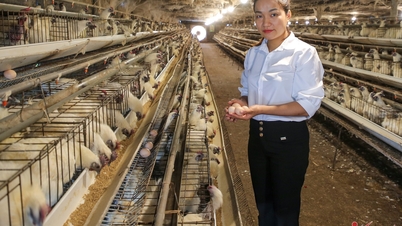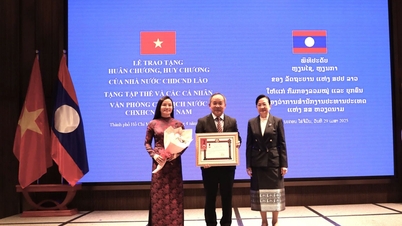Does your child have any of the following characteristics?
Have you ever seen this phenomenon: When they reach middle school or high school, many children who were considered excellent students in elementary school suddenly become very average students. Why can't these "other people's children" maintain their achievements?

Illustration
1. Objective reasons: The number of subjects increased dramatically and the difficulty increased.
In primary school, the main subjects are only Math and Vietnamese, the knowledge is relatively simple, intuitive and easy to understand. As long as your child is diligent and spends time studying, his/her achievements will be quite stable.
However, when entering secondary school, in addition to the three main subjects, children must study Biology, Geography, History, Physics, Chemistry... If children still maintain the slow learning habits as in primary school, they will easily be overloaded and lead to a state of lopsided learning, and their learning results will not be as expected.
Moreover, secondary and high school knowledge is much deeper and broader, sometimes even abstract. If your child does not have good logical thinking, learning will become difficult, and the score will not be high.
2. Subjective causes: Outdated learning methods and lack of initiative
Some children in primary school are used to being supervised and urged to study by teachers and parents. When they reach secondary school, without close supervision, they will lack initiative in their studies. In addition, many children are only used to rote learning and doing exercises mechanically, without understanding the nature of the knowledge. As the difficulty increases, this way of learning will no longer be effective.
Such children when entering secondary school often cannot keep up with the fast pace of teaching of teachers. If the child does not have good learning methods, determination and the ability to self-study and self-think, it is very difficult to achieve high results.
What are "real good students"?
1. Good study habits
Many education experts have emphasized that primary school performance is not as important as study habits.
Highly focused: Good students are often very focused in class, not distracted by external factors, not daydreaming or doing personal work, and actively interacting with teachers.
Effective learning: When doing homework or studying at home, children are also very focused, can quickly get into the groove of learning without being urged. In addition, habits such as preparing lessons before going to class, reviewing after school, reading books regularly, being diligent and constantly improving themselves are also signs of a truly good student. If parents want their children to maintain their achievements when they go to secondary school, they need to focus on practicing these habits from primary school.
2. Strong self-learning ability
Whether your child studies on their own or is forced to study will yield completely different results.
Self-Planning: Good students are often able to plan their own studies, manage their progress, and proactively expand their knowledge beyond textbooks.
Set clear goals: Children are often oriented from a young age, knowing how to set big goals and divide them into short-term goals such as by semester or by month.
Self-management: Good students often do not need supervision from parents or teachers. If their academic results are not good, they will adjust their plans and are very disciplined. In addition, they are proactive in reading reference books and learning knowledge outside of textbooks.
3. Deep thinking
Secondary and tertiary knowledge requires deep, independent thinking, analytical and synthesis skills.
Solve problems yourself: When encountering difficult problems, good students often do not rush to ask the teacher but find a way to solve them themselves first.
Understand the nature of knowledge: Children not only memorize but also deeply understand the principles and laws behind knowledge.
Synthesize knowledge: Good students often know how to systematize knowledge, find connections between parts and build their own knowledge system.
Advice for parents whose children are preparing to enter secondary school
Practice initiative in learning: Encourage your child to make their own study plans, do their homework and learn new knowledge.
Develop logical thinking: Expose your child to subjects that require thinking such as Math, Physics, and participate in intellectual activities such as chess and puzzles.
Learn time management: Teach your child to manage their time properly to balance study and rest.
Encourage reading and in-depth learning: Reading not only helps children expand their knowledge but also trains their thinking and analytical skills.
Monitor and provide timely support: Although it is necessary to let children be independent, parents should still closely monitor their children's learning process, promptly detect and support when their children encounter difficulties.
Primary school achievement is just the beginning. To help your child maintain his or her performance in middle and high school, parents need to help their child develop good study habits, strong self-learning ability, and deep thinking. These factors will be the key to helping your child succeed in the future.
Source: https://giadinh.suckhoedoisong.vn/rat-nhieu-hoc-sinh-gioi-gia-o-tieu-hoc-con-ban-co-3-dac-diem-nay-thi-chuc-mung-day-la-hang-that-gia-that-172250311191333906.htm



![[Photo] The parade took to the streets, walking among the arms of tens of thousands of people.](https://vphoto.vietnam.vn/thumb/1200x675/vietnam/resource/IMAGE/2025/4/30/180ec64521094c87bdb5a983ff1a30a4)


![[Photo] Cultural, sports and media bloc at the 50th Anniversary of Southern Liberation and National Reunification Day](https://vphoto.vietnam.vn/thumb/1200x675/vietnam/resource/IMAGE/2025/4/30/8a22f876e8d24890be2ae3d88c9b201c)


























![[Photo] Chinese, Lao, and Cambodian troops participate in the parade to celebrate the 50th anniversary of the Liberation of the South and National Reunification Day](https://vphoto.vietnam.vn/thumb/1200x675/vietnam/resource/IMAGE/2025/4/30/30d2204b414549cfb5dc784544a72dee)



































































Comment (0)